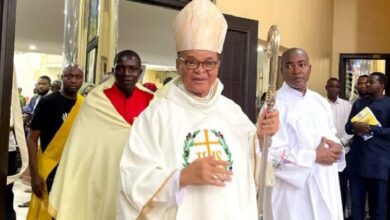Don’t Staff Catholic Schools With Non-Catholic Teachers – UDS Vice Chancellor
From Francis E. Monnie
Professor Gabriel Ayum Teye, the Vice Chancellor of the University for Development Studies (UDS), Tamale, has called on the authorities concerned, to reconsider the practice of staffing Catholic Schools with non-Catholic teachers if the desired impact of Catholic Education in Ghana is to be achieved.
He insisted that incorporating Catholicism into the School curriculum requires that instructors or teachers must be Catholics, arguing that “one cannot give what he or she does not have”. Using sport to illustrate his point, he pointed out that “there is no way a team of basketball players can win a football match”.
Prof. Teye made the call in his address as the Guest Speaker at the 42nd Conference of Managers of Catholic Educational Units (COMCEU) held in Tamale recently on the theme: Catholic Education: Enhancing the Potentials of Students and Pupils.
Speaking on the topic: What is Catholic Education, the Professor explained that a Catholic educational system is that which incorporates Catholicism into its curriculum and also puts priority on the teacher who is passionate about Christ-centred education.
He stated that Catholic education aims to create “Child-Safe” environments, both internally and externally, where children are respected, protected, empowered on their protection, and where staff are skilled, confident, and competent.
Prof. Teye pointed out that Catholic Schools are distinct from public Schools in focusing on the development of individuals.
He stressed that managers, teachers and students alike, are required to focus on four fundamental rules, namely: The Catholic identity of the School, education in regards to life and faith, celebration of life and faith and action and social justice.
On Catholic students, Prof. Teye posited that Catholic Schools are to strive to help each student to develop a realistic and positive self-image, thus enabling pupils and students to become the “best-version-of-themselves”.
He added that Catholic students are taught to set goals that do not only serve themselves, but also benefit others or society.
He enumerated some benefits of Catholic education which included a spiritual view of the world, inspired view of the Scriptures, civic responsibility and engagement, value of service (you are your brother’s keeper), discipline, (with emphasis on self-discipline and Christ-like attitude), promoting safe environment and passionate instructors or teachers who are passionate about their job; that is, a passionate work force with integrity.
Prof. Teye lamented that in some Catholic Schools, only the heads are Catholics while the rest belong to other faiths. He reported that some Local Managers have over looked Catholic teachers when it comes to appointments while non-Catholic Education Units have rather accepted such teachers.
He therefore called on the Catholic Church to recognise their own to inculcate Catholic values in the students, quizzing “how can you appoint someone who does not even believe in Hail Mary, to teach his or her students to say this prayer”.
The four-day Conference was attended by Most Rev. Philip Naameh, Metropolitan Archbishop of Tamale and President of the Ghana Catholic Bishops’ Conference (GCBC), Most Rev. John Bonaventure Kwofie, Bishop of Sekondi/Takoradi Diocese and Episcopal Chairman of Education at the GCBC and Most Rev. Peter Paul Angkyier, Bishop of Damongo Diocese.
